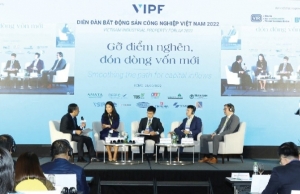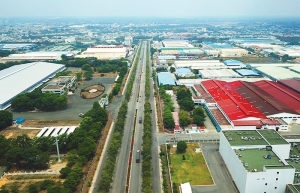Outlining the legalities for industrial property funds
Vietnam’s continuing and increasing desirability as a stable and low-cost manufacturing jurisdiction has created fertile ground for investment in the industrial property sector and merger and acquisition (M&A) activity in this sector is expected to increase markedly during the next 5-10 years.
M&As in Vietnam’s industrial property sector can, however, be a tricky affair. Every target project and land site must always be assessed on the basis of its unique merits. Rarely are the key legal considerations the same in relation to any two target land sites. Nevertheless, there are key legal issues which are invariably of paramount importance and should always be high on the due diligence priority list for any investor considering an acquisition in this sector.
 |
| Justin Gisz-Partner Frasers Law Company and Dinh Thi Hien Ly-Senior associate Frasers Law Company |
Zoning of land for industrial purposes is subject to prime ministerial approval and invariably follows a lengthy and complicated bureaucratic process involving numerous governmental stakeholders. Approved master plans are also subject to amendment, supplementation, and/or replacement from time to time.
It is crucial that any industrial property development project in Vietnam must be consistent with the applicable master plan. This is true of all kinds of these projects, whether in the form of the development of entire industrial parks (IPs), industrial facilities within them, or standalone projects outside.
Any inconsistency between the applicable master plan and the facts of any target project, asset, or entity, should always be highlighted as a red flag issue when identified in legal due diligence.
Land clearance processes in Vietnam, meanwhile, are rarely straightforward and it is common for residual land clearance issues to present a major obstacle to the successful completion of an industrial property venture. The key guiding principle in relation to land clearance is that it is never complete until it is actually complete.
Sellers will often represent that land clearance is “almost complete” or is “expected to be completed imminently”, when in fact completion of land clearance is highly problematic due to the intransigence of a small number of resilient land use rights holders.
Buyers should always take a circumspect approach to ensure that they do not acquire assets which remain subject to outstanding land clearance procedures, and wherever possible should insist that land clearance risk be borne by the seller.
In relation to any industrial property development project in Vietnam, the list of necessary state approvals that are required to be in place before the project goes live is invariably lengthy, complicated, and unique to the particular project.
Extreme care needs to be taken in conducting legal due diligence on any target asset, to ensure that a comprehensive list of necessary approvals is prepared and then verified against the facts. Buyers should always insist that licensing risk remains with the seller, to the maximum possible extent.
Thankfully, the degree to which environmental compliance is taken seriously by key governmental and private stakeholders in Vietnam has been continuously improving in recent years and this trend is expected to continue. Historically, however, environmental compliance practices and enforcement in Vietnam have left much to be desired and prospective buyers in the industrial property sector in Vietnam need to be highly alert to this reality.
Apart from proper environmental due diligence (in the sense of physically checking contamination and the like), it is of paramount importance that buyers investigate and verify matters such as the legal compliance and efficacy of wastewater treatment facilities and the holding by target companies of correct, current, and valid state approvals and certifications as required by applicable Vietnamese law.
In relation to M&A targets in the form of entire IPs or entities holding industrial property assets within them, it is crucial for buyers to determine and assess the impact of the form in which the IP developer holds land use rights over the entire land area.
Significant legal and/or financial implications can arise from matters such as whether the IP land use rights are held in the form of land allocated by the state or land leased by the state; whether the land use rights are subject to one-off, lump sum, or rent payments; and whether or not the existing land use rights holder is fully up-to-date with its obligations to pay to the state the applicable land use fees or land rent. For example, mortgages cannot be granted over land use rights which are held in the form of land leased by the state subject to the payment of annual land rent.
Successful investment in Vietnam’s industrial property sector in the form of M&A is entirely possible and is frequently achieved. Careful due diligence is exceedingly important, however, due to a range of highly variable factors.
 | Vietnam opens arms to flow of IZ investment Vietnam remains a bright spot in attracting foreign direct investment with continuous interest from Asia, Europe, the United States, and ASEAN, particularly from those getting involved in industrial parks in the country. |
 | Industrial real estate remains defiant in stock market Many businesses in the industrial property sector recorded strong business results in the first half of 2022, with rental demand and average rates in increasing industrial zones increasing. |
What the stars mean:
★ Poor ★ ★ Promising ★★★ Good ★★★★ Very good ★★★★★ Exceptional
 Tag:
Tag:
Related Contents
Latest News
More News
- Citi economists project robust Vietnam economic growth in 2026 (February 14, 2026 | 18:00)
- Sustaining high growth must be balanced in stable manner (February 14, 2026 | 09:00)
- From 5G to 6G: how AI is shaping Vietnam’s path to digital leadership (February 13, 2026 | 10:59)
- Cooperation must align with Vietnam’s long-term ambitions (February 13, 2026 | 09:00)
- Need-to-know aspects ahead of AI law (February 13, 2026 | 08:00)
- Legalities to early operations for Vietnam’s IFC (February 11, 2026 | 12:17)
- Foreign-language trademarks gain traction in Vietnam (February 06, 2026 | 09:26)
- Offshore structuring and the Singapore holding route (February 02, 2026 | 10:39)
- Vietnam enters new development era: Russian scholar (January 25, 2026 | 10:08)
- 14th National Party Congress marks new era, expands Vietnam’s global role: Australian scholar (January 25, 2026 | 09:54)





















 Mobile Version
Mobile Version